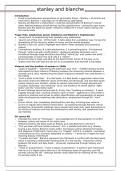stanley and blanche
Introduction
o Freud’s psychodynamic perspectives on personality theory - Stanley = id (primal and
instinctive), Blanche = superego (an id affected by upbringing)
o Stanley and Blanche’s relationship = external representation of Blanche’s mental
state: fighting between primal desires and the sophistication - during the rape scene,
Stanley wins the battle for power, reflective of Blanche’s orectic nature taking over
her mental state
Tragic foils, emphasises power imbalance and Blanche’s helplessness
o 'canary-bird', re-emphasising their predator-prey relationship
o 'squirm out of that one', 'off the hook', S talks about B in a predatory way: he lays the
foundations of the hierarchy within his house and the animal kingdom
o Stanley is foil to B, used to highlight each-other’s flaws (brutality and fantastical
nature)
o Contradictory qualities: B is delicate/feminine, S is primal/impulsive - B introduced
through “white suit with a fluffy bodice”, displaying delicate femininity, but S
introduced through stage directions describing “animal joy” and “power and pride”. -
contrast peaks in Scene Ten as B calls S a “swine!”
o Shows the play is tragic and adds to the deterministic nature of the play, as he
implies from the start that the two are so incompatible that downfall is inevitable
Violence and the position of women in 1940s
o “peals of laughter”, “[slamming] the bathroom door shut” - childlike fantasy harshly
interrupted by blunt violence of Stanley (exposes the unnerving contrast between a
monster and a child, representing the power imbalance between men and women in
the 1940s)
o “hurls a plate to the floor” - B is Old South, S is New South = aggression rather than
discussion shows the different values of the New and Old South, and how New South
values violence over intellect, wishes to express masculinity through physical acts
including “bellowing” and “booming” voice, and tendency to smash objects “light-
bulbs” and the “small white radio”
o M and S attempt sexual actions with B. M only tries “fumbling to embrace”, S seals
tragedy through rape, reaching climactic point of motif – aggression to this extent is
epitome of violence and serves to reflect objectification and sexualisation of women
while simultaneously exploring male dominance, emphasised through B’s “inert”
body
o Occurs off-set, then completely dismissed the next day, mirroring how violence
occurs on regular basis behind closed doors - by exploring through feminist critical
perspective, W presents challenge many women face when they claim themselves to
be victims of violence and they are dismissed by both society, and sometimes their
own families
OS versus NS
o Changed his name to “Tennessee” – acknowledgement of dramatization of conflict
between culture and values of his native land
o Williams presents the deep south as flawed, and uses Blanche to criticise it
o “Pull you down off them [white] columns”, N.S. is spiteful and harsh (e.g. Stanley
buying a bus ticket), Blanche means white: Tennessee said he admired the beauty
and elegance of Old South, hence play is a “tragedy” and N.S. is spiteful – somewhat
controversial as O.S’s economy depended on slavery – “I write out of regret for that”
meaning beauty of Old South
o ”Crumble and fade”, Blanche represents the Old South in conflict with the New South
which is starting to deteriorate showing birth of a new society - Shows the conflict
between Old South and New South – physically represented through Stanley and
Blanche
o 'I have an acquaintance', 'I have a lawyer acquaintance', S wants to give impression
that he is of a higher status than he is (W introduces sense of hypocrisy over NS
secretly valuing the OS – although Stanley mocks Blanche for showing off her class,
he secretly wants it too




